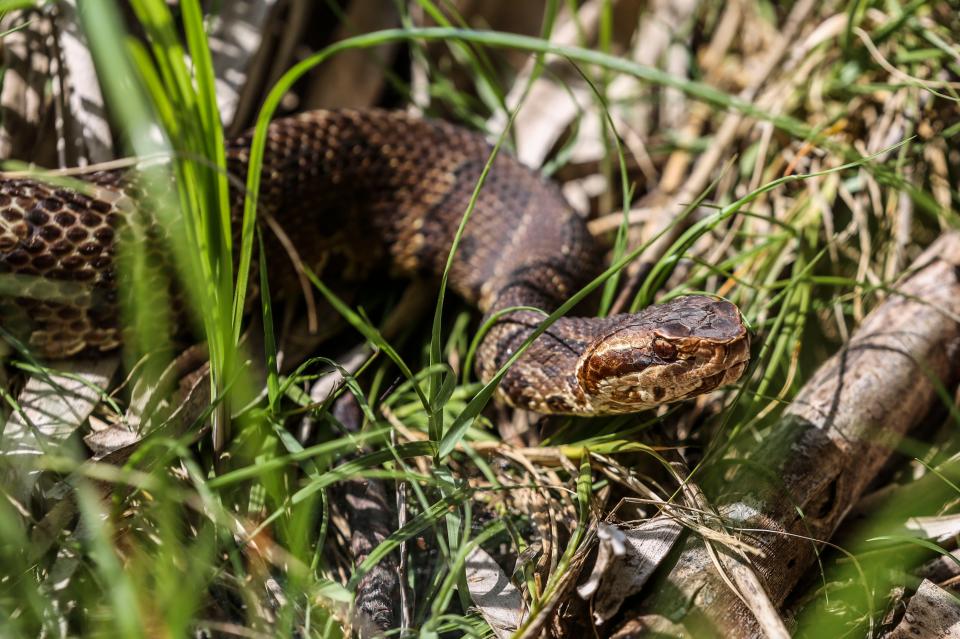Copperheads are by far the most common venomous snake in North Carolina, but many N.C. residents harbor false beliefs about the species.
Here’s what to know about copperheads as weather heats up.
Are copperheads aggressive? Are copperhead bites deadly?
In general, snakes are not typically aggressive toward humans. While it makes for a painful bite, copperhead venom generally poses minimal risk to bite victims. In fact, NC poison control says that about half of all bites result only in pain and mild swelling.
Furthermore, Triad-based pest control company Critter Control stated that copperheads often “dry bite,” meaning they excrete no venom at all.
More: 5 venomous snakes in NC, Asheville: What to know about rattlesnakes, copperheads, more
Where are copperheads found?
Copperheads are found in all 100 counties in N.C. Critter Control said that this is in part due to the presence of rodents in populated areas.
“Because rodents live among people to get their food scraps, copperheads live among us to get to the rodents,” the website stated.
As for preferred habitats, it’s no myth that copperheads are fond of some less-than-ideal hiding places. These spots can include children’s toys, lawn equipment, wood piles and other similar areas. Critter Control suggests simply keeping a tidy yard may help ward off snakes.
More: Bird flu cases in NC cattle: Should I be worried about HPAI spread?
What snakes are mistaken for copperheads?
Copperhead snakes are generally about 3 feet in length as adults, with a light brown base color and contrasting dark brown, hourglass-shaped pattern. Young snakes often have yellow tail tips.
Critter Control noted that many people assume any brown snake with darker brown banding is a copperhead. The truth is, there are other snakes in N.C. that fit this description, mainly including harmless species like corn snakes, juvenile rat snakes and water snakes.
“Avoid killing snakes regardless,” the Critter Control website said. “Dangerous snakes should be handled by experts and non-venomous snakes should be left alone.”
More: Do cicadas really attract copperheads? What to know about emergences in Asheville area
Are baby copperheads more dangerous?
One of the most commonly repeated myths about copperheads is the idea that baby snakes have less control over their bites, resulting in excretion of extra venom that makes these bites more deadly than those from adult copperheads.
Critter Control debunked this idea.
“This myth has been repeated forever and is not based on anything. That doesn’t mean their bites aren’t dangerous — just not more-so than adult copperheads.”
More: Tick-borne diseases on the rise: Here’s what to know about tick season in Asheville, NC
Can copperheads climb trees?
After a video of a rattlesnake sitting on a tree branch went viral earlier this year, Arizona-based Rattlesnake Solutions confirmed that, while it is false that only non-venomous snakes can climb trees, you probably shouldn’t worry about aerial snake attacks.
While Rattlesnake Solutions specializes in — you guessed it — rattlesnakes, the statement also applies to copperheads and cottonmouths. The Florida Fish and Wildlife Conservation Commission described these species as poor climbers that are rarely found in trees.
More: Bear spotted in downtown Asheville. Here’s what to know about common bear misconceptions.
Are copperheads and water moccasins the same thing?

Another common misconception is that copperheads and water moccasins are the exact same species. While they are related — both are moccasins, a type of pit viper — copperheads are a different species than water moccasins or cottonmouths.
“They are close relatives, but are not the same,” the website said.
More: Bear spotted in downtown Asheville. Here’s what to know about common bear misconceptions.
Iris Seaton is the trending news reporter for the Asheville Citizen Times, part of the USA TODAY Network. Reach her at [email protected].
This article originally appeared on Asheville Citizen Times: Can copperheads climb trees? Common snake myths debunked.
Source Agencies



